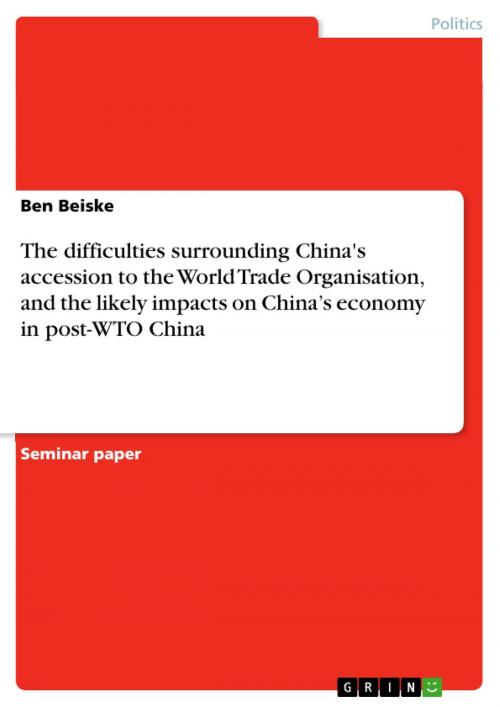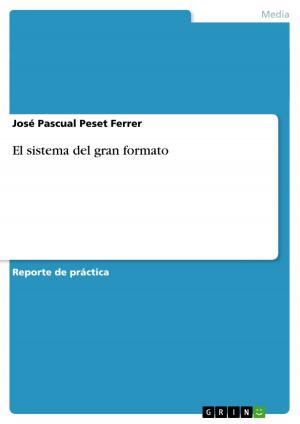The difficulties surrounding China's accession to the World Trade Organisation, and the likely impacts on China's economy in post-WTO China
Nonfiction, Social & Cultural Studies, Political Science, International, International Relations| Author: | Ben Beiske | ISBN: | 9783638205559 |
| Publisher: | GRIN Publishing | Publication: | July 17, 2003 |
| Imprint: | GRIN Publishing | Language: | English |
| Author: | Ben Beiske |
| ISBN: | 9783638205559 |
| Publisher: | GRIN Publishing |
| Publication: | July 17, 2003 |
| Imprint: | GRIN Publishing |
| Language: | English |
Seminar paper from the year 2003 in the subject Politics - International Politics - Topic: International Organisations, grade: 1.6 (A), University of Manchester (Manchester School of Management), course: Manchester School of Management, 28 entries in the bibliography, language: English, abstract: What were the difficulties surrounding China's accession to the World Trade Organisation (WTO)? Why has it taken the People's Republic of China (PRC) over 15 years to join? What are the expected benefits and disadvantages of joining? What changes is WTO membership likely to bring to China's economy in the future? These are the question this paper will address. WTO accession by China is often seen as the most significant event about China in the last decade, even ahead of the Taiwan Independence issue, which continues to penetrate world news periodically. Since the end of the Cultural Revolution in 1978, China has been on a course of economic reform. Today, Chinese are richer than ever before in history, with the country itself having experienced extended periods of extraordinary growth. Specifically, this report will highlight China's first attempts to join the WTO more than 15 years ago in chapter two. Chapter three will focus on the main areas of difficulty surrounding WTO accession, while chapter four will comment on the final accession in December 2001. The expected economic advantages and disadvantages for China will be discussed in chapter five; finally, chapter six will offer a brief future outlook for China, again mainly from an economic perspective.
Seminar paper from the year 2003 in the subject Politics - International Politics - Topic: International Organisations, grade: 1.6 (A), University of Manchester (Manchester School of Management), course: Manchester School of Management, 28 entries in the bibliography, language: English, abstract: What were the difficulties surrounding China's accession to the World Trade Organisation (WTO)? Why has it taken the People's Republic of China (PRC) over 15 years to join? What are the expected benefits and disadvantages of joining? What changes is WTO membership likely to bring to China's economy in the future? These are the question this paper will address. WTO accession by China is often seen as the most significant event about China in the last decade, even ahead of the Taiwan Independence issue, which continues to penetrate world news periodically. Since the end of the Cultural Revolution in 1978, China has been on a course of economic reform. Today, Chinese are richer than ever before in history, with the country itself having experienced extended periods of extraordinary growth. Specifically, this report will highlight China's first attempts to join the WTO more than 15 years ago in chapter two. Chapter three will focus on the main areas of difficulty surrounding WTO accession, while chapter four will comment on the final accession in December 2001. The expected economic advantages and disadvantages for China will be discussed in chapter five; finally, chapter six will offer a brief future outlook for China, again mainly from an economic perspective.















